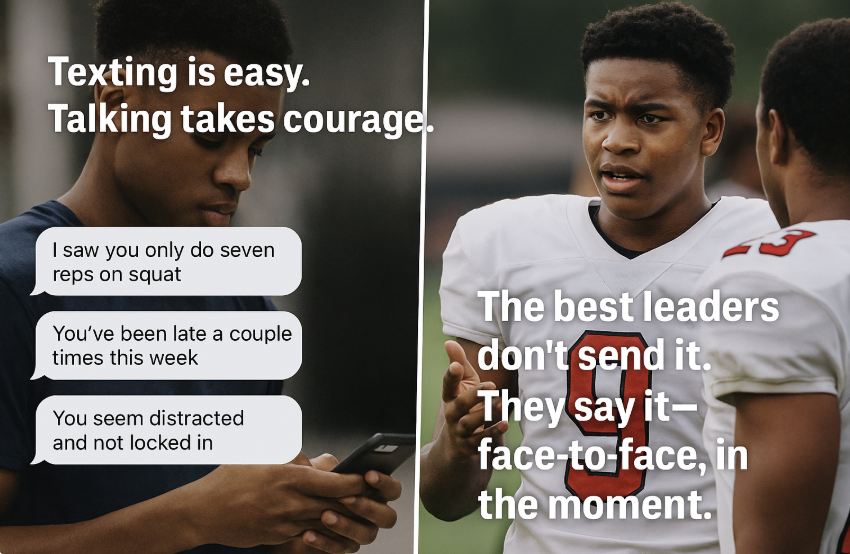The Most Underrated Skill in Sports is… communication
If I could ask every coach in the world one question—
“Do your players communicate well on the field?”
The overwhelming answer would be:
Absolutely not.
And that lack of communication? It’s costing teams every single day—on the practice field, in the weight room, and especially in the biggest moments of competition.
That’s why we created The Blueprint—to train athletes to say something when it matters.
Here’s one example of how we do it:
“STACK! SLANT!”
The ball is on the 1-yard line.
There are 26 seconds left on the clock.
No timeouts remain.
One play will decide the Super Bowl.
Seattle lines up.
And across from them is a rookie.
Malcolm Butler had never started a game in the NFL. Undrafted and unproven, he had faced this exact play just two weeks earlier during practice, where Coach Belichick chewed him out for not reacting quickly enough.
But instead of giving up, he committed himself. He studied film late into the night and took every opportunity with the scout team.
Now, standing on the 1-yard line in the Super Bowl, he saw it again—the same motion, the same stack, the same formation.
It was the very play that had embarrassed him in practice.
But this time, he recognized it.
Here’s the question:
What do you think he did next?
Did he just trust his instincts?
Did he stay silent and hope someone else noticed?
Did he wait for the snap?
No.
He didn’t hesitate.
He didn’t take a wild guess.
He spoke up loudly:
“Stack! Slant!”
He called out the route and made the critical play. He ensured his teammates could hear him because preparation means nothing if communication is lacking. He jumped the route and intercepted the pass, saving the day for the Patriots.
It all came down to one moment of clarity and the courage to communicate.
That’s the story of the biggest interception in Super Bowl history.
One reason it happened is that Malcolm Butler spoke up before the play. He had studied the game and recognized the formation, but more importantly, he communicated what he saw.
The 3 Aspects of Communication We Must Coach
Just like tackling, communication is a skill. And like any skill, it has fundamentals.
We must coach athletes to:
1. Say It Early – Before the Play Begins
Don’t wait. Don’t react. Say it before it happens and give teammates a head start.
2. Say It Loud – With Confidence
If no one hears you, it doesn’t matter. Be a thermostat, not a thermometer.
3. Say It Clearly – Keep It Simple
One or two words. No paragraphs. Direct, actionable, and common language.
If it’s late, quiet, or confusing—it’s not leadership. It’s just noise.
What Happens When Athletes Stay Quiet?
Confusion spreads
Accountability disappears
Energy drops
Coaches become the only source of leadership
Silent teams don’t play fast—they play separately.
Why Speaking Up Matters More Than Ever
Most athletes today will fire off a text before saying something out loud.
They’ve grown up in a world of screens, DMs, and message bubbles.
Face-to-face conversations—especially the hard ones—feel awkward, uncomfortable, even confrontational.
But here’s the truth:
You can’t build trust, correct effort, or lead a team through a screen.
That’s why real leadership feels rare today.
Because talking takes courage, especially when you're calling a teammate up to a higher standard.
It’s easy to send:
👉 “I saw you only do seven reps on squat.”
👉 “You’ve been late a couple of times this week.”
👉 “You seem distracted and not locked in.”
Your team doesn’t need another message bubble—it needs athletes who lead with their voice.
In the weight room.
On the practice field.
On the sideline when things start to slip. The best leaders don’t send it.
They say it—face-to-face, in the moment.
That’s why we must train it.
Because silence isn’t leadership—it’s a missed opportunity.
And that’s exactly what The Blueprint is built for—
💥 Helping athletes find their voice, speak confidently, and lead when it counts most.
How Coaches Can Reinforce It Every Day
Echo Every Call – No silent reps. Everyone repeats the play, call, or adjustment.
Assign Communication Roles – Empower players to take the lead vocally.
Use Chaos Drills – Put players in pressure situations where communication is required.
Praise the Talkers – Acknowledge and reward confident, early, clear communication.
Final Word: Say Something
Communication is leadership in real time.
Teach it. Track it. Demand it.
Because when the lights are bright and the pressure is highest—
The team that talks wins.
The Blueprint Summer Series
If you're ready to build a team that communicates, competes, and leads differently, the Blueprint Summer Series was designed for you:
Leadership Academy trains captains and leadership council members to use their voice, set the tone, and lead from the front.
Built Different equips your entire team with the mindset, language, and Confidence to speak up, stay locked in, and compete with purpose.
Two systems. One mission:
Develop your leaders. Elevate your team. Own the summer.

